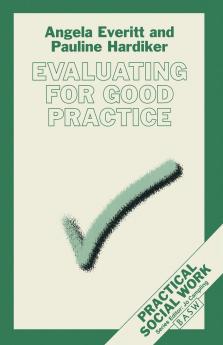This Book is Out of Stock!
English
Paperback
₹3964
₹5075
21.89% OFF
(All inclusive*)
Delivery Options
*COD & Shipping Charges may apply on certain items.
Review final details at checkout.
Looking to place a bulk order? SUBMIT DETAILS
About The Book
Description
Author(s)
With the changing political economy of social welfare evaluation has become prevalent in the personal social services and voluntary sector organisations. This text argues that rational-technical and pluralist models of evaluation may collude with new managerialism to act as powerful processes of control. Alternative critical models of evaluation which take account of power are explored so as to enable practitioners to take responsibility for evaluating practice both in order to inhibit poor or even corrupt practice and to promote good practice.
*COD & Shipping Charges may apply on certain items.
Review final details at checkout.
₹3964
₹5075
21% OFF
Paperback
Out Of Stock
All inclusive*
Details
ISBN 13
9780333599679
Publication Date
-11-11-1996
Pages
-236
Weight
-283 grams
Dimensions
-140x216x13.63 mm








